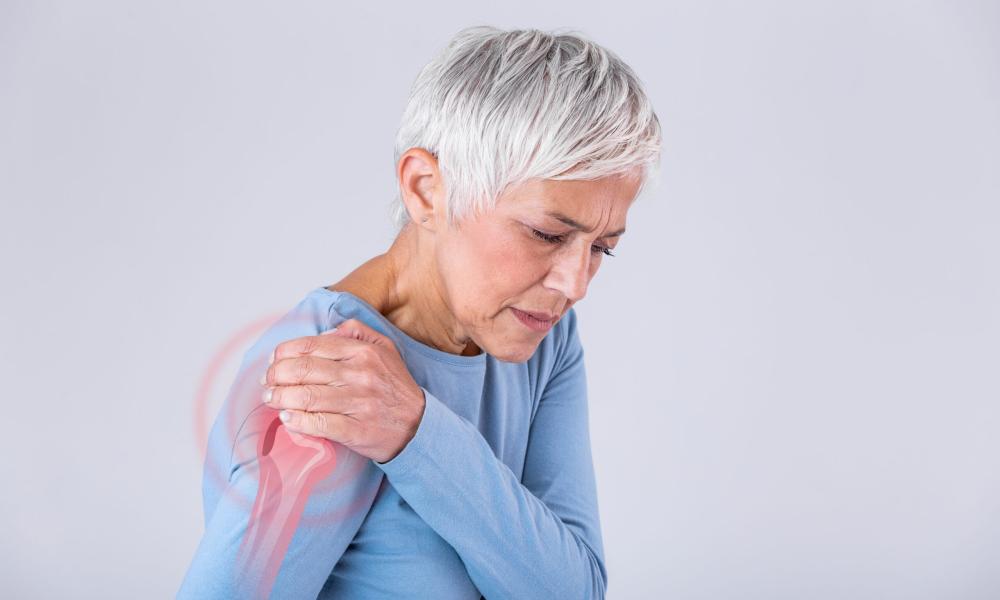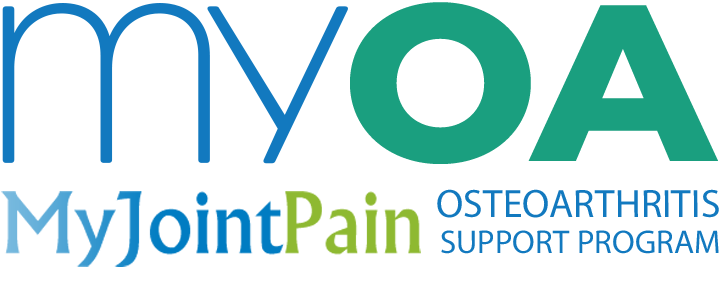
This fact sheet has been written for people with a painful shoulder, due to osteoarthritis (OA). It provides information about shoulder pain and what can be done to help it. It also tells you where to go for further information.
What is shoulder pain?
Shoulder pain is pain that is felt in the shoulder area, at the top of the arm. It may be a sign that the joints, muscles or other parts of the shoulder are injured, strained or not working properly. About 1 in 10 people experience shoulder pain at some time in their lives.
Shoulder pain is common, but it is rarely due to any serious disease. Staying active will help you get better faster and prevent more problems.
What are the symptoms of osteoarthritis in the shoulder?
Shoulder pain is most commonly felt in the front of the shoulder or in the upper part of the arm. Pain is usually felt when moving the arm and you may notice it with only certain movements. Most shoulder problems do not cause pain when the arm is not moving. However, many people find it painful when lying on the sore side in bed at night. Pain that travels right down to your hand, with tingling in your fingers, may be from a problem with your neck, rather than your shoulder.
There are many joints, muscles and other structures in the shoulder that can cause pain. In most cases, it may not be possible to find a cause of the pain. It can be worrying not knowing exactly what is wrong. The good news is that research shows you do not need to know the exact cause of the pain to be able to deal with it successfully. It is rare for shoulder pain to be caused by a serious medical problem.
Should I see a doctor?
You should talk to your doctor or other health professional if your pain is bothering you. They will ask you about your symptoms and examine you. In most cases tests such as x-rays and blood tests are not helpful in finding out the cause of shoulder pain unless there has been an obvious injury or strain. They may check for any serious medical problems that could be causing your pain, but these are rare. You should see your doctor if:
- your pain does not settle down after a few weeks, or starts getting worse.
- you have symptoms such as losing weight, tingling or numbness in arm or hands.
- you have osteoporosis and you have persistent pain.
- you have shoulder pain after a fall or accident.
- your pain does not settle down or starts getting worse, especially if you have pain when you are resting your shoulder.
What causes shoulder osteoarthritis?
The shoulder is a freely moving ‘ball and socket’ joint, where the upper arm (humerus), collarbone (clavicle) and shoulder blade (scapula) are connected by ligaments, tendons and muscles. While osteoarthritis in the shoulder is uncommon, it is possible that the articular cartilage around the joint may thicken and produce more fluid than normal, causing joint swelling, pain and stiffness. Once this happens, the joint may develop bony spurs (osteophytes), which may lead to pain and stiffness.
Osteoarthritis in the shoulder is considered uncommon, and would mostly develop from trauma, injury, chronic overuse or frequent inflammation.
When will my shoulder pain settle?
For most people, shoulder pain settles down over several weeks but can vary between people. At least one in two people with shoulder pain will have fully recovered within six months. Unfortunately, shoulder pain can return, even in people who have fully recovered. It is not possible to predict which cases of shoulder pain will return.
What can I do for shoulder joint pain/osteoarthritis?
- Talk to your healthcare team. It is normal to worry about the cause of your pain and how it will affect you. Talking to your doctor or other health professional about your worries can be helpful. You will usually find there is no serious cause and there are ways you can deal with it.
- Learn ways to manage pain. Talk to your healthcare team about ways to relieve your pain. For example, there are medicines that can help with shoulder pain. It’s best to start with simple analgesics and measure their effect before trying others. Always talk to your doctor or pharmacist about your medicines, as even natural or over-the- counter medicines can have side effects.
Stay active. Your shoulder is designed for movement. The sooner you get your movement and strength back, the sooner your shoulder will feel better. You may need to rest or reduce some activities when the pain is bad.
But resting for more than a day or two usually does not help and may do more harm than good. See a physiotherapist or other health professional for advice about exercises to keep your shoulder moving. See the Working with your healthcare team information sheet for more information about seeing a physiotherapist, exercise physiologist or an osteopath.
Acknowledge your feelings and seek support. It is natural to feel scared, frustrated, sad and sometimes angry when you have pain. Be aware of these feelings and get help if necessary. You can learn skills to recognise and calm anxiety or strong emotions if you find they start to affect your daily life. See the Awareness of thoughts & emotions treatment.
There are many other treatments for shoulder pain that have not been well proven. Some unproven treatments may still be useful, however further research is needed.
These treatments include:
- acupuncture
- mobilisation of the shoulder
- transcutaneous electrical nerve stimulation (TENS)
heat and cold (eg. hot water bottles, heat packs, ice packs).
Your healthcare team can give you more advice and information about whether any of these or other treatments might be useful for you.
Other resources
State and Territory arthritis offices
Your local Arthritis Office can provide further information to assist you and will have a range of education and support activities. Click here to find your local office.
Websites
Arthritis Research UK: www.arthritisresearchuk.org
The National Health and Medical Research Council (NHMRC) has an information sheet on acute shoulder pain available only via the internet at www.nhmrc.gov.au
The Australian Physiotherapy Association can help you ‘find a physio’ at www.physiotherapy.asn.au
Osteopathy Australia ‘find an osteopath’ at https://osteopathy.org.au/find-an-osteo






